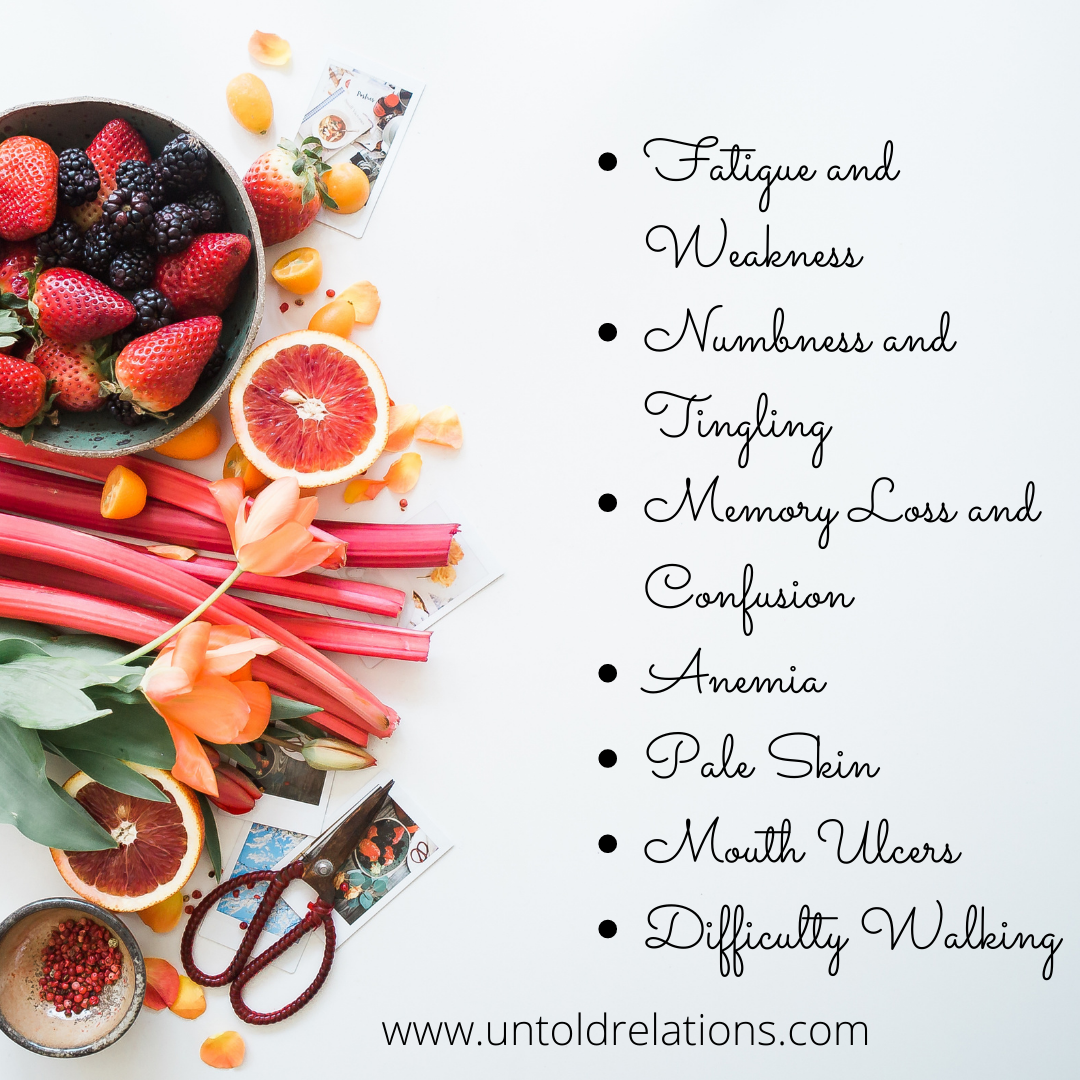Vitamin B12 is a crucial nutrient that plays an essential role in the production of red blood cells and nerve function. A deficiency of this vitamin can cause a range of symptoms, some of which can be severe if left untreated.
“The greatest wealth is health”
Signs You’re Low on Vitamin B12

Here are some signs that you may be low on vitamin B12:
Fatigue and Weakness
As mentioned, vitamin B12 plays a crucial role in the production of red blood cells, which carry oxygen throughout the body. A lack of oxygen can lead to feelings of fatigue and weakness. This symptom can be gradual and may not be noticed until it becomes severe.
Numbness and Tingling
Vitamin B12 deficiency can cause damage to the nerves in the body, leading to numbness and tingling sensations in the hands and feet.
Memory Loss and Confusion
Vitamin B12 is also essential for proper brain function, and a deficiency can cause memory loss and confusion.
Anemia
A lack of vitamin B12 can lead to a type of anemia called megaloblastic anemia, which causes the body to produce fewer red blood cells that are larger than normal. This can lead to fatigue, weakness, and shortness of breath.
Pale Skin
A vitamin B12 deficiency can cause a lack of red blood cells in the body, leading to pale skin and a yellowish tinge to the skin and eyes.
Mouth Ulcers
Some people with a vitamin B12 deficiency may develop mouth ulcers or sores on the tongue.
Difficulty Walking
In severe cases, a vitamin B12 deficiency can cause difficulty walking and balance problems due to nerve damage.
If you experience any of these symptoms, it’s important to speak to your healthcare provider. They can order a blood test to check your vitamin B12 levels and provide you with appropriate treatment, which may include vitamin B12 supplements or dietary changes.
“Good health is not something we can buy. However, it can be an extremely valuable savings account.”
Tips for Overcoming Vitamin B12 Deficiency and Living a Healthy Lifestyle
If you are low on vitamin B12, there are several steps you can take to overcome the deficiency:
- Speak to your healthcare provider: If you are experiencing any of the symptoms of vitamin B12 deficiency, speak to your healthcare provider. They can perform a blood test to check your vitamin B12 levels and recommend an appropriate treatment plan.
- Increase your intake of vitamin B12: Eating foods rich in vitamin B12, such as fish, meat, poultry, eggs, and dairy products, can help increase your intake of the vitamin. For vegetarians and vegans, fortified cereals, soy products, and nutritional yeast are good sources of vitamin B12. If you have trouble getting enough vitamin B12 through your diet, your healthcare provider may recommend a vitamin B12 supplement.
- Make dietary changes: In addition to increasing your intake of vitamin B12, making dietary changes can help you maintain a healthy lifestyle. Focus on eating a variety of fruits, vegetables, whole grains, lean protein, and healthy fats. Limit your intake of processed and sugary foods and drinks.
- Exercise regularly: Regular exercise can help improve your overall health and reduce your risk of chronic diseases such as heart disease, diabetes, and cancer. Aim for at least 150 minutes of moderate-intensity exercise or 75 minutes of vigorous-intensity exercise per week.
- Get enough rest: Getting enough rest is important for maintaining good health. Aim for 7-8 hours of sleep per night, and try to establish a regular sleep schedule.
Solutions for Overcoming Vitamin B12 Deficiency and Achieving a Healthy Lifestyle
Here are some solutions to overcome vitamin B12 deficiency and live a healthy life:
- Increase your intake of vitamin B12-rich foods
- Take a vitamin B12 supplement
- Consider getting vitamin B12 injections
- Limit alcohol consumption
- Quit smoking
- Exercise regularly
- Get enough rest
- Manage stress
- Follow a balanced diet
- Consider seeing a healthcare professional for further evaluation and treatment
- Read food labels to identify vitamin B12-fortified foods
- Consider a dietitian consultation to create a personalized meal plan to address vitamin B12 deficiency
- Take a multivitamin that includes vitamin B12, as a backup plan to ensure adequate intake of the vitamin
By considering these solutions, you can help overcome vitamin B12 deficiency and maintain a healthy lifestyle. It is essential to speak to your healthcare provider if you experience any symptoms of vitamin B12 deficiency. They can diagnose the condition, perform necessary tests, and provide an appropriate treatment plan.
“The food you eat can either be the safest and most powerful form of medicine, or the slowest form of poison.”
Final Thought
Vitamin B12 deficiency can cause a range of symptoms, including fatigue, weakness, numbness and tingling, memory loss, anemia, pale skin, mouth ulcers, and difficulty walking. If you are experiencing any of these symptoms, speak to your healthcare provider, who can perform a blood test and recommend an appropriate treatment plan. In addition to treating the deficiency, making dietary changes, exercising regularly, and getting enough rest can help you maintain good health and prevent chronic diseases.

0 Comments